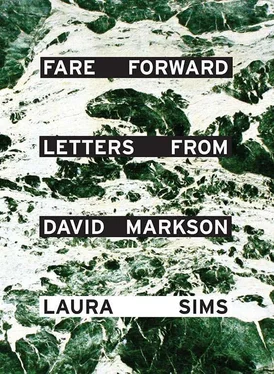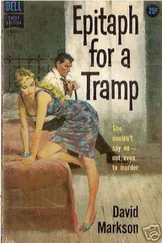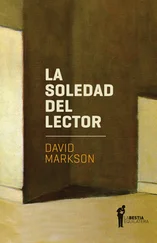LS:So obviously the index-card material plays its own crucial role also.
DM:Obviously. And not just in the way it’s shuffled and rearranged, as we said earlier. That’s often just craft anyway, a question of aesthetic balance. Of getting the parts to interrelate, what I label at least once in each book as “interconnective syntax.” Or call it poetic structure, despite the fictional length. But what matters even more is the choice of materials. When I’m collecting that stuff, I usually copy out six or eight or ten items for every one I eventually keep. Most of which have to deal with age, death, idiotic reviews, impoverishment, whatnot. It’s that which affects that sense of the “portrait” that unfolds — matters that he himself would be preoccupied with.
LS:Death particularly, indeed. Not just the suicides in Reader, but then how people die, where people die, most recently when they die. Though with overlapping between books also. Why that central preoccupation?
DM:Hey, Sims, I’m a hundred and nine years old. Can we skip that subject, maybe?
LS:Okay. How about this instead? How does religion fit into your life? Or the work?
DM:Not the most appetizing alternative. I mean since it doesn’t, not in any way, shape, or form whatsoever. Yes, there are any number of references to it in the books, but I’m sure you’ve noticed that every single one of them is negative. Or cynical. Or even vehement, about all the bigotry and hatred and misery and disaster it promulgates — wherever, whenever, any form of it. No, there’s no connection with my work at all, certainly no religious impulse behind it.
LS:Another jump, then. A quote from This Is Not a Novel: “ Photography is not an art.” A pretty damning dismissal. And what about film? Does either medium influence you at all?
DM:I’ve had this argument before. Goodly souls lecturing me about composition, about lighting, all the rest. But in what way does a photograph ever reconceive reality like a Cézanne, say? Or a Matisse? And how can you look at the brush strokes in a van Gogh, or in a Rembrandt — let alone experience the illusion of light bursting out of the pigments in those same very two — and then think of chemically reproduced images on treated paper as genuine art?
LS:Minor art, at least?
DM:Okay, I surrender. But as for film, there again I’ve never been a buff. And again, it takes a pretty lax definition to use the word art here also. Too many cooks. Romanticism, thy name may be David, but for me art is one poor disaffected wretch all by himself ripping up sheet after sheet in his garret and silently screaming because he can’t find that elusive single right word.
Or it’s Michelangelo, flat on his back on that scaffolding, month after month, and now and then dropping heavy planks if he suspects the Pope is down below peeping. I’m borrowing from my latest book there, incidentally. But no, I believe no influence from film at all.
LS:Tell me about the internet. Or did we already half answer this, when you said you don’t use a computer?
DM:A good deal of what I know about it makes me want to tear my hair. There seems to be no editorial responsibility out there whatever. And no authority, to evaluate things. I don’t mean those damned-fool reviews that every dimwit and his cousin Hiram can type in, but even drivel from the so-called Web magazines. Good grief, someone wrote an essay on my work, some few years ago, which I happened to see — a long essay — and the simp couldn’t even get the chronology of my life correct, which is readily available. But far more egregious, the piece was patently dishonest. He raised some question or other about what he felt was a major failing of mine, and only at the end did I realize he’d done so without saying two words about one of my most central books, and one which knocked his theory into a cocked hat. Meaning he hadn’t even read it. No print editor would have let him get away with that, but here nobody gave a damn. No, I more than realize the conveniences I’m missing, with no e-mail and the rest, but I suspect I’m enduring very little loss in literary terms by going without.
LS:Those two old “entertainments,” as you call them— Epitaph for a Tramp and Epitaph for a Dead Beat —they were recently reissued by Shoemaker & Hoard. Do you really feel that they are mere “entertainments,” or do they rise above that self-deprecating title?
DM:Oh, I guess they hold up for what they are, but no, what they “are” are still crime novels, no more. Listen, way back after I did the second one, my agent at the time said the publisher wanted to give me a contract for a series, two a year continually, with the same detective, and even though I was still not getting much serious work done, I dismissed the idea without a second thought. But as I say, I don’t disavow the things — in fact I got a kick out of rereading them, after forty-five years — but that’s it.
LS:Is there any talk about your satirical Western The Ballad of Dingus Magee being re-released?
DM:That would be something else. And after almost the same length of time I’m still pretty proud of that one. I’ve always felt it’s well put together. And everybody found it hilarious — serious-funny, so to say. But then that cretinous Frank Sinatra film sent it eternally down the drain.
LS:Though perhaps with the film so long forgotten someone might take a new look?
DM:Don’t transcribe that. People will suspect I asked you to dangle it out there.
LS:All right, another change of subject. Your latest is called The Last Novel. Naturally, any number of us hope it isn’t that. What’s next?
DM:Come hell or high water, it will be different from these last four — the index-card four, as we seem to be calling them. I actually threw in a reference to the word “tetralogy” in this last one, but in all truth I’d never initially intended that. After Reader’s Block, I simply found myself addicted to collecting that stuff. I’d even heaped up those cards with each of the next three before I ever had any definite sense of what I’d do with them — like half molding the flesh before I’d contrived the skeleton to hang it on. But after this last one I forced myself, categorically, to quit. I can stumble onto the most seductive anecdote or quotation in the world, one which normally would have been a spectacular thematic fit for me, and I grit my teeth and ignore it.
LS:Okay, so no index-card material.
DM:Actually, the basic form will probably be somewhat the same, still “experimental” in that way. Short takes as opposed to lengthy narrative, no fictional baggage, no dramatic scenes, no episodes, and many of what we’ve been calling odds and ends coming from an actual relationship itself. But it’s all extremely tentative in my head still.
LS:But you used the word “relationship.” You mean a novel about people, plural, instead of merely the isolated single individuals you’ve been dealing with? And not just in these four titles, but as long ago as in Wittgenstein’s Mistress as well?
DM:Yes. A man and a woman. A guy and a gal. Him, her. Them.
LS:I’m noticing that twinkle in your eye. You’re not by any chance talking about a love story?
DM:Who? Didn’t I tell you I’m a hundred and nine years old?
Читать дальше












